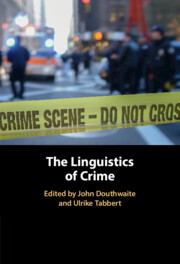Book contents
- The Linguistics of Crime
- The Linguistics of Crime
- Copyright page
- Contents
- Figures
- Tables
- Contributors
- 1 Editorial Introduction
- 2 The Metaphoric and Metonymic Conceptualisation of the Other
- 3 Prison Metaphors
- 4 Ideology in Mainstream Crime Fiction
- 5 A Critical and Stylistic Analysis of the Depiction of the Transnational Human Trafficking Victim in Minette Walters’ The Cellar
- 6 The Linguistic Construction of Political Crimes in Kurdish-Iraqi Sherko Bekas’ Poem The Small Mirrors
- 7 Stylistic Aspects of Detective Fiction in Translation
- 8 Transnational Adaptations of Sherlock Holmes
- 9 The Ethical Effects of Voice-Over Narration on a Victim Testimonial
- 10 Realising Betrayal
- 11 ‘Nossa Vida é Bandida’
- 12 Deviant Mind Style of a Schizophrenic Offender
- 13 Narrower or Broader Ground? The Role and Function of Metaphors in Legal Discourse
- 14 Condemning the Condemners
- 15 Ideology in Critical Crime Fiction
- Index
- References
6 - The Linguistic Construction of Political Crimes in Kurdish-Iraqi Sherko Bekas’ Poem The Small Mirrors
Published online by Cambridge University Press: 05 January 2023
- The Linguistics of Crime
- The Linguistics of Crime
- Copyright page
- Contents
- Figures
- Tables
- Contributors
- 1 Editorial Introduction
- 2 The Metaphoric and Metonymic Conceptualisation of the Other
- 3 Prison Metaphors
- 4 Ideology in Mainstream Crime Fiction
- 5 A Critical and Stylistic Analysis of the Depiction of the Transnational Human Trafficking Victim in Minette Walters’ The Cellar
- 6 The Linguistic Construction of Political Crimes in Kurdish-Iraqi Sherko Bekas’ Poem The Small Mirrors
- 7 Stylistic Aspects of Detective Fiction in Translation
- 8 Transnational Adaptations of Sherlock Holmes
- 9 The Ethical Effects of Voice-Over Narration on a Victim Testimonial
- 10 Realising Betrayal
- 11 ‘Nossa Vida é Bandida’
- 12 Deviant Mind Style of a Schizophrenic Offender
- 13 Narrower or Broader Ground? The Role and Function of Metaphors in Legal Discourse
- 14 Condemning the Condemners
- 15 Ideology in Critical Crime Fiction
- Index
- References
Summary
Ibrahim and Tabbert continue on the topic of victims with an exploration of a selected passage by Iraqi Kurdish poet Sherko Bekas’ The Small Mirrors. The authors employ the framework of Critical Stylistics (Jeffries 2010) that is particularly suited to detect ideological meaning in texts.
- Type
- Chapter
- Information
- The Linguistics of Crime , pp. 105 - 120Publisher: Cambridge University PressPrint publication year: 2023
References
- 3
- Cited by



